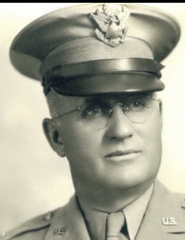Miles Views Battle Action in Germany
By Frank Miles
(Daily Times Herald War Correspondent)
In the Field with the First Army (IDPA) -- I entered Neiderhaussen, captured by our third armored division tanks, one day after I witnessed from a ridge a half mile away from the town.
In Neiderhaussen I saw American tanks blasting nazi positions a short distance beyond. Jerries fired some shells into roads south of the town, intending to halt the roaring stream of American ground destroyers, which was pouring toward them.
One enemy blast hit a building a block from where I had met Pfc. Walter Massman, Centerville, a combat engineer. He had been driving a supply truck, which had halted. Evidently the Hawkeye had in pride let his comrades know where he was from for when I asked a group of of any of them was from our state several said: "No, but Walt Massman is."
We talked mostly about the good old home-land - his two and a half daughter, Marcella, and his father Jay Massman, who is a commander of the American Legion post at Moravia. Private Massman, who had been overseas 19 months, said Sgt. John Danay, Numa, of his outfit, was among his friends.
In a nearby courtyard, happily under guard of American MPS, were 63 Frenchmen, Belgians, Dutchman and Poles, who as war prisoners of the Germans had been doing forced labor in and near Neiderhaussen.
Pierre Grandjean, of St. Martin, France, who was taken by the nazis while fighting as a French soldier on June 24, 1940, and hadn't seen his now 15-year-old daughter for five years, was so joyous he could hardly talk to Lt. Daniel D. Brod, of New York, who acted as interpreter for me.
Grandjean, 43 years of age, was a gardener when called to active service in the French army. He took a heavy toll of the nazi invaders until his rifle ammunition gave out, I was told.
"Our guards were very harsh," he said. "I worked on a farm producing food but was allowed only a little of the poorest. The best went to the German army.
"America has saved France twice. America is a very great nation."
On another street was an entrance to an air raid shelter which went down to a depth of 30 feet and had cement ceiling, walls and floor.
About 400 German old men, women of all ages and children were crowded into it for protection against nazi fire. A few objected to going in but were firmly but kindly overruled by the American guards on duty between the door and a pile of sand bags.
An American soldier helped a bent old woman over the last 100 yards of her trip by carrying her suit case in one hand and taking one of her arms in his other hand.
"I can smack Jerry soldiers with pleasure but I feel sorry for the old folks and kids," he smiled.
He had been in a lot of combat and had well defined ideas as to why the United States was at war.
"It's tough for these people's homes to be torn up," he added, "but it's a good thing because it will so impress youngsters with what war is they may not be so eager when they grow up to attack other countries as most of their daddies did."
Pfc. Don Grovert, of Newhall, was in a squad lauded in Stars and Stripes for great work removing mines and booby traps after having to swim ashore from an overturned boat in the Roer river.
"Parken Verboten (parking forbidden)" was on a huge road sign by which an American tank had stopped to hurl shells as nazis ahead.
Source: Carroll Daily Times Herald, March 31, 1945
![]()

